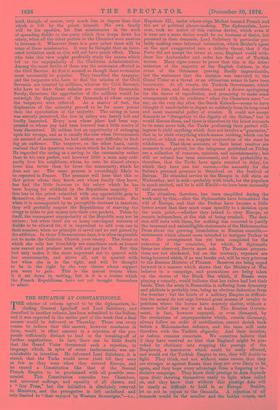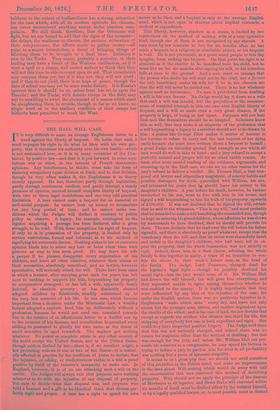THE SITUATION AT CONSTANTINOPLE.
THE scheme of reform agreed to by the diplomatists, in- eluding General Ignatieff and Lord Salisbury, and described in another column, has been submitted to the Sultan, and it was expected in the earlier past of the week that a final answer would be delivered on Thursday. There was every reason to believe that this answer, however courteous in form' would in effect amount to a rejection of the pro- posals sufficiently distinct to lead to the breaking-off of further negotiations. In fact, there can be little doubt that the Grand Vizier threatened such a rejection, in language which, in spite of some fanfaronnade, was un- mistakable in intention. He informed Lord Salisbury, it is stated, that the Turks would never yield till they were as few as they were when they entered Europe, and he caused a Constitution like that of the Second French Empire to be proclaimed with all possible cere- monial. This Constitution concedes two Chambers, and universal suffrage, and equality of all classes, and a "free Press," but the initiative is absolutely reserved to Ministers, and the prerogative is left undefined and only limited to "that enjoyed by Western Sovereigns,"—i.e., Napoleon ifi., under whose reign Midhat learned French and the art of political phrase-making. The diplomatists, how- ever, took no notice of this curious device, which even if it were not a mere device would be no business of theirs, but persisted in their demands, Lord Salisbury in particular pro- bably making some informal intimation, which Reuter's agent on the spot exaggerated into a definite threat, that if the Porte did not accept the terms at once, England would with- draw her Ambassador and order her fleet out of Turkish waters. Many signs concur to prove that this is the deter- mination of the majority of the English Cabinet, in the event of the Ottomans proving finally impracticable, but the statement that the decision was conveyed to the Grand Vizier as a threat or an ultimatum seems to have been inaccurate. At all events, the Turkish Government, which wants a loan, and has, therefore, issued a decree apologising for the decree of repudiation, and promising to make some arrangement with its creditors "when the Chambers meet "- say, on the very day after the Greek Kalends—seems to have thought it unadvisable to depart so suddenly from its long-tried and most successful policy of evasion. It could not accept demands so "derogatory to the dignity of the Sultan," but it would discuss them, and there is therefore by the latest accounts to be some more talk, the Turks professing their perfect will- ingness to yield anything which does not involve a "guarantee," that is, to yield everything which means nothing, which can be evaded, or which can in a happier conjunction of the stars be withdrawn. That these accounts of their latest resolves are accurate-is not proved, for the telegrams published on Friday are a collection of rumours, opinions, and misstatements- ; but still no refusal has been announced, and the probability is, therefore, that the Turks have again resorted to delay, for which they have one fair excuse,—the necessity for the Sultan's personal presence in Stamboul on the Jestival of Bairam. He attended service in the Mosque in full state on Wednesday, and is said—probably with truth, for the populace is much excited, and he is still Khalif—to have been unusually well received.
The situation, therefore, has been simplified during the week only by this,—that the diplomatists have formulated the will of Europe, and that the Pashas have become a little better aware that they must come speedily to a decision upon the main point,—whether they intend to obey Europe, or remain independent, at the risk of being crushed. The deci- sion still rests with them, for nothing has occurred to justify the incessant and unintelligible statements of the Mahommedan Press about the growing irresolution in Russian councils,— statements which almost seem intended to instigate Turkey to war. No arrangement has yet been completed for the extension of the armistice, for which, if diplomatic forms are observed, Servia must ask. The Russian prepara- tions are not slackened, but on the contrary, expenses are being incurred which, if no war breaks out, will be very grievous to the Russian Minister of Finance. Reserves are being urged forward in a manner which shows that the Ministry of War believes in a campaign, and precautions are being taken on the shores of the Black Sea which, if Russia were playing a comedy, would indicate that her rulers had lost their heads. That the army in Bessarabia is suffering from dysentery and phthisis is probably true, being an obvious deduction from the weather ; but the heads of a military Empire in difficul- ties fin money do not urge forward great masses of cavalry to positions where the horses have scarcely shelter, without a sincere belief that war is at hand. The Russian Govern- ment, in fact, however annoyed, or even dismayed, by the revelations of unpreparedness which, outside Germany, always follow an order of mobilisation, cannot shrink back before a Mahommedan defiance, and the issue still rests therefore with the Turkish oligarchy. And their decision, as before, remains uncertain. We ourselves believe that if they have received no hint that England might be pro- voked by obstinacy into stopping the passage of the Bosphorus, a manoeuvre which could be easily effected, and would cut the Turkish Empire in two, they will decide to fight. They think, and not without some reason, that they are stronger as against Russia than they are ever likely to be, again, and they hope every advantage from a lingering or in- decisive campaign. They know their prestige in Asia depends upon their showing themselves ready to fight when called on, and they know that without this prestige Asia will be nearly as difficult to hold in as Europe. Besides, let us not be unjust to the Osmanlis. A rejection of all demands would be the manlier and the bolder course, and boldness to the extent of foolhardiness has a strong attraction for the race which, with all its modern aptitude for chicane, has never surrendered anything except under absolute com- pulsion. We still think, therefore, that the Ottomans will fight, but we are bound to add that the signs of the moment— the delays, the readiness to discuss, the anxious reiteration of their non-possumus, the efforts made to gather money—all point to a secret irresolution, a dread of bringing things or allowing them to be brought to a final issue. Isolation is new to the Turks. Very many, probably a majority, of their leading men have a dread of the Western civilisation, as if it were a spell or a charm, and cannot endure to think that they will not this time be able to count upon its aid. That irresolution may conquer them yet, but if it does not, they will not yield ; and if they do not yield, there is no hope of peace, though the date of actual war may yet be some weeks distant. It is Russia's interest that it should be so, unless frost has set in upon the Danube; and the Turks, with Asiatic troops in the field, may not be unwilling to await the abatement of a season which must be slaughtering them in crowds, though so far as we know, no single word as to the sanitary condition of their camps has hitherto, been permitted to reach the West.



































 Previous page
Previous page